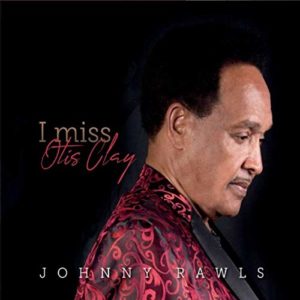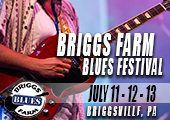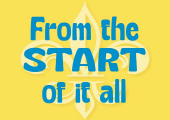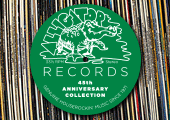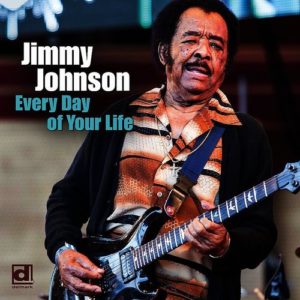 JIMMY JOHNSON
JIMMY JOHNSON
Every Day of Your Life
Delmark – DE-861
Several others like to claim the title, but 91-year-old Jimmy Johnson is almost certainly our oldest active bluesman, and his chops—vocal and instrumental—remain virtually undiminished after over 60 years of work as both sideman and leader. His guitar work, aggressive and deeply emotional, is also enriched with jazz-tinged sophistication (appropriate for a man whose early guitar heroes included the likes of Grant Green and Kenny Burrell), and his keening, high-tenor voice remains striking and immediately recognizable.
Johnson has always been eclectic; although he cut his teeth in Chicago clubs alongside such veterans as Freddie King, most of the bands he worked with in the 1960s and early ’70s specialized in soul and pop fare, a stylistic bent that was reflected in early recordings. As a sideman he accompanied the likes of Tyrone Davis, Otis Clay, Ruby Andrews, Walter Jackson, Denise LaSalle, Bobby Rush, and Cicero Blake, among others. Only later, when the blues “revival” among white listeners opened the door to a new career, did he re-brand himself as a bluesman.
Although this disc, like most of Johnson’s latter-day work, is solidly blues based, his diverse palette is on full display. Hard-charging funk rhythms (along with a delightful excursion into reggae-laced buoyancy in My Ring), his trademark minor-key chord constructions, and a sharp-eyed, poetic lyricism permeate this set. Most of the songs are originals; the borrowed material (Fenton Robinson’s Somebody Loan Me a Dime, Percy Mayfield’s Strange Things Happening, Bobby Bland’s Lead Me On [still credited to Don Robey, but actually penned by Lavelle White]) is graced with eloquent lyric storytelling and plenty of harmonic and melodic depth. His guitar playing is, quite simply, a master class in blues fretwork—impeccably structured and logical, yet laced with a powerful emotional thrust. He also showcases his too-often underrecognized gifts as a keyboardist on Lead Me On. The band—including pianist Roosevelt “Hatter” Purifoy, guitarist Rico McFarland, bassist J.B. Fuller, and drummer Pooky Styx—is drawn from Chicago’s A-list of sidemen; vocalist Typhanie Monique contributes some torrid gospel-soul backing to the title tune.
There’s at least one thing, though, that Jimmy Johnson has yet to do—he needs to revisit I Feel the Pain, his harrowing paean to the Middle Passage and its murderous legacy. It’s spellbinding in solo performance (he sang it for me, accompanying himself on keyboard, in his home studio when we spoke for my current book, Blues Legacy) but by his own admission it didn’t quite succeed on Two Johnsons Are Better Than One, his 2001 album with his brother Syl. If he can, he should include a fresh version of it on his next project. For now, though, this release is a must-hear—Jimmy Johnson is really a bit of a miracle, and it’s one that we’re all blessed to be able to share.
—David Whiteis
JOHNNY RAWLS
I Miss Otis Clay
Third Street Cigar – No #
Although steeped in old-school soul and soul blues, Johnny Rawls isn’t really a “deep soul” artist like his late friend and mentor Otis Clay. His timbre, though winningly gritty, is relatively light, and as a songwriter he favors sprightly rhythms and pop-tinged melodic lines. Still, Rawls, whose resume includes a stint as O.V. Wright’s bandleader and musical director, has the heart of a soul man. That heart is proudly on display throughout this set.
Lyrically, Rawls is first and foremost a storyteller, and his dedication to meaningful narrative comes through in his singing as well. Whether he’s crooning an ironically tender complaint to an emotionally distant lover (Can’t Read Your Mind), celebrating the joys of unfettered carnality (the bouncy Slow Roll It, which has no relation to the well-known Sir Charles Jones song), or ruminating on the purpose of life itself (The Wind), he delivers his message with a minimum of histrionics, preferring to rely instead on unadorned emotional honesty. The title tune, as expected, is melancholy yet uplifting, with strong echoes of People Get Ready in its chord structure (appropriate for a tribute to a gospel-infused soul man like Clay), and if Rawls’ voice occasionally wavers or tightens as he delivers it, that only serves to accentuate the depth of feeling his song invokes, and which clearly possessed him during its recording.
Johnny Rawls’ discography is substantial—he’s dropped at least 18 albums as leader or co-leader (including three alongside Clay himself), as well as a couple that he recorded early on with his erstwhile musical partner L.C. Luckett—and he deserves much wider recognition than he has so far achieved. Let’s hope that this disc, along with a little luck and the support of big-eared listeners, will help him achieve it.
—David Whiteis
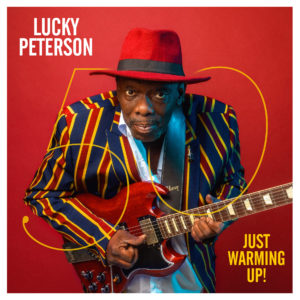 LUCKY PETERSON
LUCKY PETERSON
50: Just Warming Up!
Jazz Village – No #
As recently documented in a Living Blues cover story (#261), the year 2019 marked the 50th anniversary of Lucky Peterson’s recording career, dating back to his debut as a five-year-old prodigy. On his latest release from the French label Jazz Village, Peterson celebrates that milestone by showcasing his wide-ranging skills as singer, organist, guitarist, and songwriter. For this project the artist wrote or co-wrote ten new tracks and shared production duties with Shawn Kellerman. Five well-conceived interpretations of cover songs augment the almost 74-minute setlist, which interweaves retrospective themes and tributes among material more focused on the here and now.
The scat singing–accented opener, 50 Years, establishes the album’s titular concept with Peterson proclaiming, “Got in the game when I was a kid, playing the blues like my daddy did.” But the lyrics to this hard-charging shuffle look forward as well, buoyed by defiant proclamations such as, “Fifty years later, fifty years strong,” and, “You think that I am through? I’m just warming up!” Here, as on the majority of tracks, Peterson’s atmospheric organ playing and raspy yet enthused vocals are often in the foreground. While he sometimes veers toward the shouter mode, even on more subdued numbers—such as the moodily introspective Dreamin’ About You—his voice emotes powerfully.
Yet Peterson doesn’t always go it alone. Six tracks feature guest singers, each of whom collaborates with him in duet. Perhaps the strongest of such pairings occurs with the R&B stylist Tamara Tramell (who is also his wife). Their respective voices—hers supple and smooth, his rough-edged and gritty—naturally play off each other as oppositional yet complementary forces. In Don’t Want Nobody But You, they engage in a passionate lyrical dialogue that glides along a jazzy groove, gently greased by instrumental fills on saxophone and organ. That same duo makes the magic happen again on I Will Die 4 U, a mellow love song that fuses an easygoing Caribbean beat with subtle flourishes on strings and acoustic guitar. Meanwhile, on Takin’ Care of Mine Peterson does all the singing until a middle passage where the French rapper Aelpéacha takes the mic to interject some funky commentary (en français). Another hip-hop-influenced number, Kissin’ on My Lips, effectively incorporates a brief rap interlude by the New Orleans artist known as Jakk Jo. In a more traditional vein, the rocking blues Let the Good Time Party Begin is substantially juiced when Danielia Cotton adds her vocalizations to the mix (which includes a cameo on harmonica by Sugar Blue). Moreover, on the closing track, an organ-driven medley of Amazing Grace / Precious Lord, the great gospel singer Sharon Riley joins Peterson to make the final verses fervently soar heavenward.
Other highlights include the lone instrumental, Clickety Click, a supremely funky organ workout that evolves over a rolling quasi-Mardi Gras beat embellished by horns. In a bit of a surprise (given the song title), the road-warrior’s complaint The Blues Is Driving Me springs from an artfully conjured reggae rhythm, fueled by agile percussion, bass, and organ riffs. Also noteworthy, Peterson pays tribute to the “Three Kings” of blues music with selected cover songs made famous by each: Freddie King’s Pack It Up, B.B. King’s Never Make Your Move Too Soon, and Albert King’s Angel of Mercy.
In the final analysis, this album celebrates and exemplifies some of the core strengths that for 50 years have served Peterson well: his fluid musicianship, stylistic versatility, and genre-blending approach to blues, as well as his long-established knack for cool collaborations with other singers.
—Roger Wood
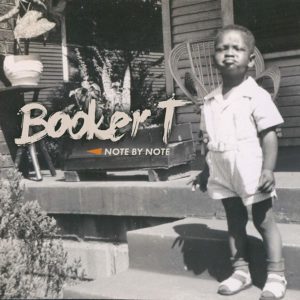 BOOKER T.
BOOKER T.
Note by Note
Edith Street Records – ESR-51182
Note by Note is a companion to Booker T. Jones’ recently published autobiography, Time Is Tight: My Life, Note by Note. It both sums up six decades of music-making and opens up new doors into the future. While the program surveys his remarkable career with remakes of iconic songs from various points in his musical journey, it also looks forward through the founding of his own record label; his work with his children, Teddy Jones (lead guitar and songwriter) and daughter Olivia Jones (executive music producer and manager); and his collaborations with a corps of hand-picked new-generation feature artists.
Since his heyday at Stax Records at the helm of Booker T. & the MGs, Jones has known how to put together a great sounding record, and these 11 tracks testify that he has not lost his touch. His emotive keyboard work, woefully underrecognized soulful vocals, and production skills are all evident on Note by Note. Jones is taking a risk with these re-recordings of classic tracks because the originals are so baked in the consciousness of listeners. There really is no room for improvement on tracks like Albert King’s Born Under a Bad Sign, Otis Redding’s These Arms of Mine, Carla Thomas’ B-A-B-Y, or the MGs’ Time Is Tight, but, especially through his distinctive instrumental sound and style, Jones seems to be taking possession of the music. He’s asserting that this is what I’ve always done, and this is what I still do. This is evident on the surging remake of Time Is Tight, which features a coda that Jones has been playing in his live show for years. Because the MGs made their mark with instrumental hits and as a backup to an incomparable array of vocalists, Stax resisted letting Jones sing. He proves the shortsightedness of that on the remake of the King track (which also features some impressive blues guitar fireworks from son Teddy), as well as on the Afro-Caribbean percussion-driven recasting of Havana Moon, a tune he had previously recorded with Santana. Willie Nelson’s Stardust album is legendary; however, Jones is not generally recognized as the producer/arranger. Here he crafts a beautiful rendition of the title track with Matt Berninger delivering a deeply resonant take of the standard. Jones goes all the way back to his gospel roots and accompanies Sharlotte Gibson on a spare, soulful Precious Lord, the same song on which, at 12 years old, he accompanied Mahalia Jackson at a neighborhood afternoon tea. Back in the day, Jones had an ear for talent, and he still has it, as evidenced by his choice to have Evvie McKinney and Joshua Ledet revisit Rufus and Carla Thomas’ Cause I Love You. Other guests include fellow studio veterans drummer Steve Ferrone and bassist Melvin Brannon and relative newcomer vocalists Ayanna Irish, Ty Taylor, and DeAndre Brackensick. Jones looks to the future with two new compositions he crafted with his son Teddy, the edgy rock of Maybe I Need Saving and EDM workout Paralyzed.
—Robert H. Cataliotti
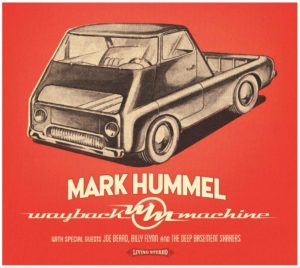 MARK HUMMEL
MARK HUMMEL
Wayback Machine
Electro-Fi – Electro-Fi 3459
With each new recording many professional blues artists—especially those who have been in the game as long as NorCal East Bay fixture Mark Hummel—face the challenge of being innovative while also respecting tradition. Color too far outside the lines and it’s no longer blues (to some fans); adhere too closely to the past and it becomes an exercise in mimicry or nostalgia. It’s a difficult line to walk, but Hummel has excelled with each project.
On Wayback Machine the veteran bluesman and the Deep Basement Shakers (Aaron Hammerman on piano and Dave Eagle on percussion and washboard) mine the electric Chicago blues sound—but not the one you’re thinking of. Hummel and company have their sights set on the decades just before Chess Records made its mark, particularly during the heyday of RCA Victor’s Bluebird imprint and its stable of artists, many of whom are now considered icons: Big Bill Broonzy, John Lee Williamson, Washboard Sam, Arthur Crudup. Joining the trio are special guests that include guitarist Billy Flynn, Kid Andersen (who is on bass detail here), and most notably, Mississippi-born guitarist Joe Beard, who takes the lead on the album’s final three cuts.
Although its title and Hummel’s own comments in the liner notes suggest a release steeped in history more than it looks to the future, it’s a testament to the musicians involved that the album feels unmistakably fresh, particularly when compared to recent entries in Hummel’s discography. This outfit explores a different kind of sound.
The opener, Flim Flam, penned by R.W. Grigsby (bassist on loan from Hummel’s Golden State / Lone Star Revue), delivers a scathing critique of our current president (“sits around tweeting on his gold-plated throne / but one day, baby, he’ll be all alone”) couched in a groove that playfully references Billy Boy Arnold’s I Wish You Would. More familiar covers (Reefer Head Woman, Cut That Out) are expertly paired with hokum (Play with Your Poodle), a country rag (Rag Mama Rag), and an up-tempo Hummel original (Road Dog). Beard’s contributions feel more like bonus tracks but will nonetheless be welcomed by those who appreciate the credibility he brings as one of the genre’s elder statesmen, particularly on his moving rendition of Five Long Years.
This is quite the impressive outing for the Deep Basement Shakers, a trio who is only a few years into their initial run. Fans of early Chicago blues are going to really dig this one.
—Roger Gatchet
 SUNNY WAR
SUNNY WAR
Shell of a Girl
Hen House Studios – HH027
Since the release of her 2014 debut, Worthless, Sunny War has been steadily garnering attention and acclaim. Born Sydney Lyndella Ward, the singer-songwriter and guitarist has punk rock roots and spent time hoboing and performing on California’s Venice Beach. Currently based in Los Angeles, she recently released her third solo album, and Shell of a Girl contains some of her strongest work to date.
In more ways than one, she brings to mind another veteran of the Venice Beach boardwalk: Ted Hawkins. Not quite blues, folk, or rock, her music combines qualities of each yet exists just outside of them. The album’s mood is muted throughout, with gentle instrumentation buoying War’s soothing vocals. But as her stage name hints, a turbulence roils under the bright surface of sound. Her lyrics are honest, unflinching, and blunt at times, with modern sensibilities and concerns. “Drugs are bad / Unless, of course, you get too sad,” she notes on Drugs Are Bad, a commentary on the dangers of pharmaceutical dependency. The utterly gorgeous melody of Off the Cuff belies its cutting, observational lyrics. “Since I’ve made it past 27 / There goes my ticket to rock ’n’ roll heaven,” she sings in cracked-bell tones on Rock n Roll Heaven. Her fingerstyle guitar is dexterous and beguiling, especially on the Latin-flavored title track and the pulsing Love Became Pain.
Micah Nelson returns as one of War’s backing musicians on this record, having played on her previous album With the Sun. The son of Willie and brother of Lukas, Nelson’s projects include Particle Kid and touring with Promise of the Real and Neil Young. He contributes melodic, Young-esque harmonica to Where the Lost Get Found and Got No Ride, and swirling organ to Off the Cuff.
Full of deeply felt lyricism and exquisite musicianship that rewards with repeated listens, there’s much to discover inside Sunny War’s Shell of a Girl.
—Melanie Young
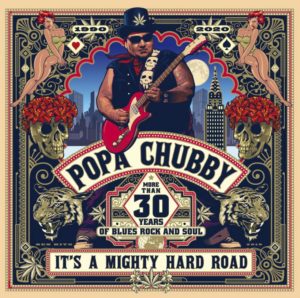 POPA CHUBBY
POPA CHUBBY
It’s a Mighty Hard Road
Popa Chubby Productions – 54324
For over 30 years, Popa Chubby (born Ted Horowitz) has been churning out his own unique blend of blues and rock. Mixing crunching guitar riffs, gruff vocals, and an inimitable street smart swagger, Horowitz has carved out his own musical niche. The bravado, wry humor, and fierce guitar slinging that fans have come to love are all in full force on It’s a Mighty Hard Road.
Horowitz has always been fiercely proud of his Bronx-bred, working class roots. The title track’s blunt lyrics establish Horowitz’s hard-bitten persona, and the upbeat rocking arrangement dials up the energy level. Rock solid rhythm work by drummer Steve Holley and bassist Brett Bass keeps the music grounded. If You’re Looking for Trouble and I’m the Beast from the East continue to lay down the bad boy attitude. Because Horowitz’s vocals and guitar chops pack such a powerful punch, the tough talk never sounds like empty posturing. If You’re Looking for Trouble is one several tracks where Horowitz serves as his own rhythm section. His drumming has a clean, no-nonsense quality and his bass lines are sparse but in the groove.
As much as Horowitz likes to play the tough guy, some of the most compelling moments on It’s a Mighty Hard Road occur when he allows listeners to glimpse beneath his hardened exterior. Let Love Free the Day sports tender lyrics and a sunny, upbeat arrangement. The flowing, lyrical guitar solo is grounded by an unflappable drumbeat and an inventive bass line; once again, Horowitz excels at being his own rhythm section. The Best Is Yet to Come gives listeners another look at Horowitz’s softer side. Delicate keyboard work from Dave Keyes helps bring Horowitz’s sentimental lyrics to life. An impassioned reading of the warhorse I’d Rather Be Blind is another high point. Horowitz’s uninhibited vocals and Freddie King–inspired guitar licks remind listeners that the blues will always be his first musical love.
A tender heart and an old soul lie beneath Horowitz’s brash demeanor. Passionate performances and a wide variety of original material make It’s a Mighty Hard Road essential listening for fans of contemporary blues.
—Jon Kleinman
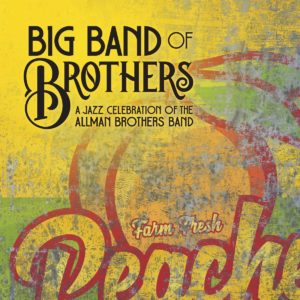 VARIOUS ARTISTS
VARIOUS ARTISTS
Big Band of Brothers: A Jazz Celebration of the Allman Brothers Band
New West Records – NM6474
The Allman Brothers Band had the closest affinity to jazz improvisation out of all the blues rock giants that emerged during the 1960s. Big Band of Brothers co-producer John Harvey relates in the liner notes how he first heard the ABB around the same time he heard drummer Buddy Rich’s big band live and immediately made a connection. He recruited drummer Mark Lanter to lead the band and produce the album. Pulling together a big band of solid jazz instrumentalists, they added some special guests, including vocalists Ruthie Foster and Marc Broussard, and the results are impressive. The focus here is on the ABB’s early catalog, culling material from the first five albums. Of course, so many of the compositions that the ABB jammed on featured a number of intersecting melodic lines that lead into extended solos, so they lend themselves to the skills of a group of jazz arrangers that includes Wycliffe Gordon, Shane Porter, Tom Wolfe, Mart Avant, and Jon Burr. These performances frequently maintain a distinct ABB sound thanks to brilliant slide guitar work of Jack Pearson or Matt Casey, often doubling with horn lines like the doubled guitar lines of Duane Allman and Dickey Betts. That ABB sound is also reinforced by the Hammond B-3 of Andy Nevala conjuring up Gregg Allman’s work.
Count Basie’s trio has to come to mind on the opener Statesboro Blues, and like Basie’s band, the Big Band of Brothers comes surging in with Broussard’s gritty drawl and Casey’s slide guitar in tandem with the horns. Broussard also delivers an impassioned take on Whipping Post. Foster’s talent continues to find new outlets for its expression as she swings hard with the big band on It’s Not My Cross to Bear and Don’t Keep Me Wonderin’. Pearson, who logged time in both the ABB and in Gregg’s band in the 1990s, delivers a blistering solo on Stand Back. Don’t Want You No More features a Horace Silver–inspired, hard bop sound. The band excels on classic instrumentals like Hot ’Lanta, Dreams, In Memory of Elizabeth Reed, and Les Brers in A Minor.
It’s really quite thrilling to hear these familiar melodic lines delivered with a big band punch, and the superior chops these players possess make for some dynamic, inventive soloing. Big Band of Brothers is a concept that really works and is a testament to the malleability and enduring appeal of blues-derived forms explored by the ABB.
—Robert H. Cataliotti
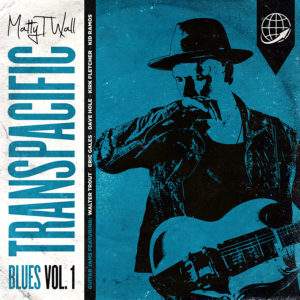 MATTY T WALL
MATTY T WALL
Transpacific Blues, Vol. 1
Hipsterdumpster Records – HIPS-19
The opening track on Wall’s energetic album, John Lee Hooker’s Boom Boom, romps and rocks with a no-holds-barred style that permeates the rest of the album. The song rockets off from the initial interplay between lead guitar and slide guitar—a kind of slithering and seductive call and response—propelled by Wall and guest guitarist Dave Hole trading licks. There’s a ZZ Top / Texas blues flavor to this version of Hooker’s tune that exposes its raunchiness and its pure joy.
Joy is Wall’s signature, for he has fun playing the blues, and he’s aiming here to have a party, even on the slower, more somber tunes. The blazing guitarist is joined on several tracks by guests that include Hole, Eric Gales, Walter Trout, Kirk Fletcher, and Kid Ramos, and as the album title indicates, there’s a real transpacific party going on. For example, Gales struts onto the scene of Hi Heel Sneakers to keep the high-octane celebration going. Between Wall and Gales, the two guitarists play off each other’s riffs, with the instrumental bridges carrying the tune higher and higher. Toward the end of the song, Wall sings note for note with Gale’s lead, showcasing Wall’s ability to turn any tune into his own. Quicksand, which features Ramos, certainly doesn’t sink into a miasmic mess but stirs up a boiling pot of rockin’ blues that keeps the muddy waters moving and swirling. The slow-burning Stormy Monday delivers a sultry, smoky blues elevated by Wall’s brilliant, stinging and crisply Alvin Lee–like leads on the bridge. Wall and Fletcher deliver a scalding version of Booker T. Jones and William Bell’s masterpiece Born Under a Bad Sign, and the album closes with a somewhat subdued and heavy version of Robert Johnson’s Crossroads.
By the end of Transpacific Blues, Vol. 1, we’re out of breath, astonished at the level of guitar playing that’s carried us along on its cascading notes and riffs, as well as from the relentless pace of the songs. Wall has thrown us a blues party we’ll never forget and that we’ll never want to stop.
—Henry L. Carrigan Jr.
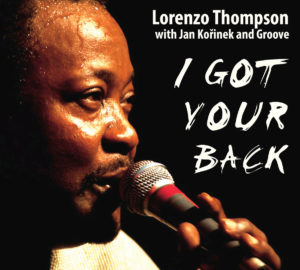 LORENZO THOMPSON WITH JAN KORINEK AND GROOVE
LORENZO THOMPSON WITH JAN KORINEK AND GROOVE
I Got Your Back
Blacktown – BTR – 2018-001
Chicago-based vocalist Lorenzo Thompson doesn’t have an extensive discography—his liner notes here tell us that this is his first recorded set of original material—but his career extends back decades; among the artists he’s worked with are such legends as Dave Myers, Detroit Junior, and Pinetop Perkins. This disc was recorded in several different studios, apparently during a recent European tour.
Thompson’s vocal style blends pop-flavored deep soul melodicism with a rough-hewn, streetsy delivery; backed by multi-instrumentalist Korinek and a robust crew of European session musicians, he evokes the swinging yet hard-edged elegance of a vintage-era show lounge (the primary exception being the acoustic, country-flavored retro outing Last Train to the City). He wrote or co-wrote nine of the 12 songs here, and for the most part the lyrics reflect that same meld of toughness and sophistication. If few new musical trails are blazed, Thompson and the band nonetheless dig into familiar yet still rich territory with soulful élan.
Perhaps the most satisfying element of this set is the apparent determination of all concerned to avoid overstatement—unlike too many modern-day blues aggregations, Thompson, Korinek, and their compatriots remember that the spaces between notes can tell stories as eloquently as the notes themselves, and that whispers and murmurs can be more intense—and a lot sexier—than screams. Although specific credits aren’t given, it’s obvious that Korinek—or someone—has listened long and hard to the work of such masterful arrangers and bandleaders as James Bolden, Joe Scott, and King Curtis; this is a “grown folks’ party” of the old school, exuberant and sometimes raw, but laced with tough, funky eloquence and wit.
—David Whiteis

